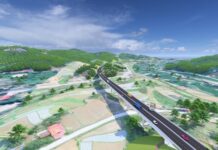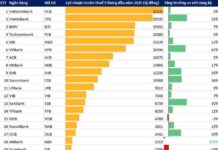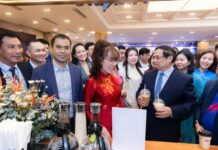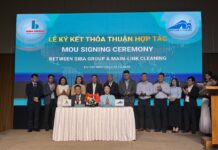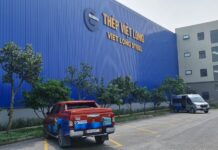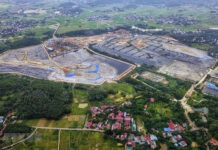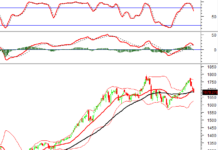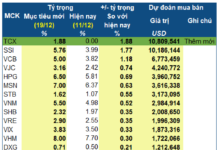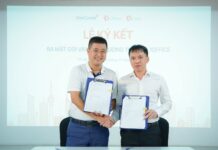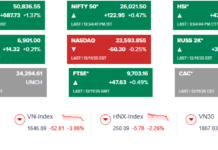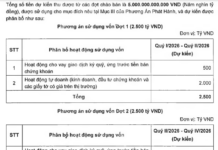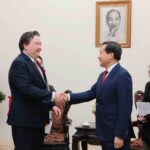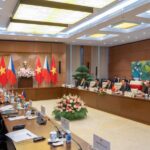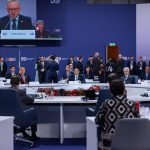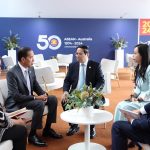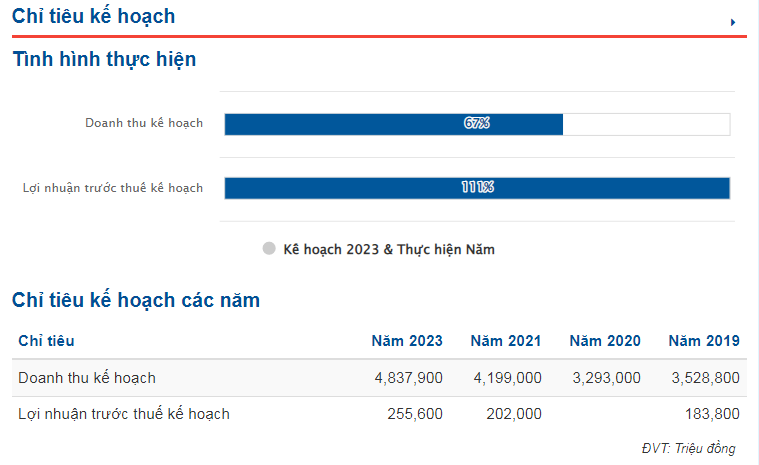1. Accepting the invitation of the Prime Minister of the Republic of India, Narendra Modi, Prime Minister Pham Minh Chinh paid a state visit to India from July 30 to August 1, 2024. Accompanying Prime Minister Pham Minh Chinh was a high-level delegation consisting of several ministers and leaders of ministries, sectors, and agencies of Vietnam.
2. On August 1, 2024, Prime Minister Pham Minh Chinh attended the official welcome ceremony at the Presidential Palace, paid tribute at the Mahatma Gandhi Memorial, and participated in a meeting and banquet hosted by Prime Minister Narendra Modi. The two leaders also witnessed the exchange of bilateral cooperation documents and met with the press. Prime Minister Pham Minh Chinh held a meeting with President Droupadi Murmu, met with Vice President and Chairman of the Rajya Sabha Jagdeep Dhankhar, and received a courtesy call from External Affairs Minister S. Jaishakar.
The Vietnamese Prime Minister also paid tribute at the statue of President Ho Chi Minh in G20 Park, delivered a policy speech at the Indian Council of World Affairs, attended and spoke at the Vietnam-India Business Forum, and met with Indian businesses.
ON POLITICAL RELATIONS
3. The Vietnam-India meeting was held in a warm and friendly atmosphere. Prime Minister Pham Minh Chinh congratulated Prime Minister Narendra Modi on his historic victory for a third consecutive term and expressed confidence that under Prime Minister Narendra Modi’s wise leadership, India will continue to thrive and assume a higher role and position in the international arena.
4. The two leaders appreciated the long-standing friendship and traditional relationship between India and Vietnam and expressed satisfaction with the strong development of bilateral relations since the upgrade to a Comprehensive Strategic Partnership in 2016. They agreed to continue implementing the results of recent high-level visits and exchanges, including the Vietnam-India Joint Vision Statement for Peace, Prosperity, and People from 2020, as well as the outcomes of this important visit.
5. The two leaders agreed that the current geopolitical situation demands closer cooperation between Vietnam and India. They acknowledged many shared views on world affairs and expressed support for a stronger voice and role for the Global South in international relations. They agreed to further strengthen the Vietnam-India Comprehensive Strategic Partnership across all fields.
6. Based on the positive development of bilateral relations, the two sides agreed to maintain regular high-level visits and exchanges at all levels.
7. The two leaders appreciated the diverse cooperation mechanisms between the two countries in the fields of diplomacy, security, and maritime cooperation, defense collaboration, legislative exchanges, trade and investment, agriculture, health, civil aviation, information and communications technology, science and technology, including atomic energy and space, tourism, and culture. They agreed to enhance bilateral dialogue in these areas, including through the Vietnam-India Joint Committee on Economic, Trade, Science, and Technology Cooperation for mutual benefit.
The leaders welcomed the signing of the Plan of Action for the Implementation of the Comprehensive Strategic Partnership for the period of 2024-2028.
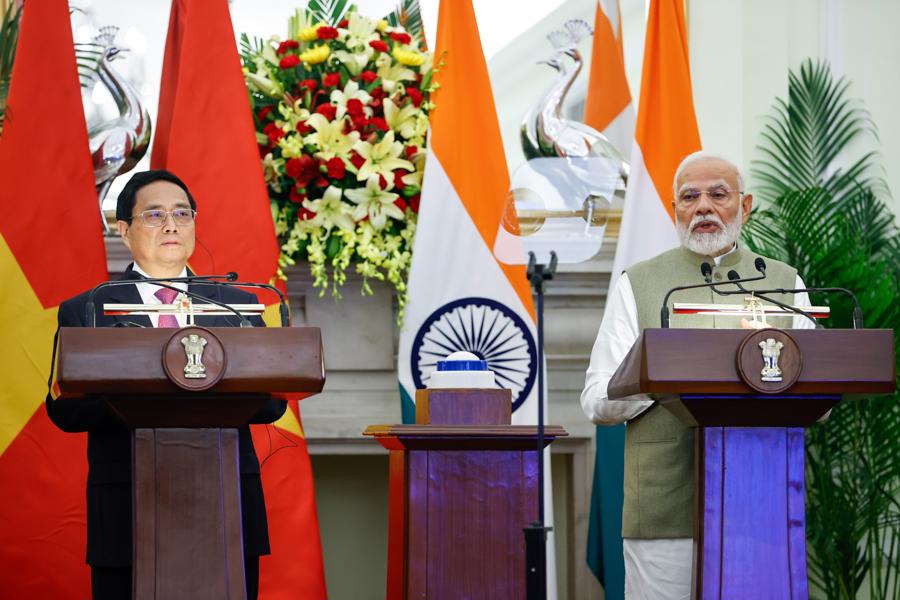
ON ECONOMIC, TRADE, AND INVESTMENT COOPERATION
8. As two rapidly developing economies, the leaders agreed to promote collaboration between governments and businesses to enhance bilateral trade, investment, and technological partnerships. They agreed on the need for closer cooperation in removing trade barriers to facilitate and boost bilateral trade beyond the current level of $15 billion. They concurred that the review of the India-ASEAN Trade in Goods Agreement would contribute to making the agreement more user-friendly, simpler, and more trade-facilitative between the two countries.
9. The two sides agreed to continue efforts to promote bilateral investment. Vietnam welcomed Indian investment in infrastructure, high technology, source technology, clean technology, information technology, auxiliary and manufacturing industries, garment and textile, automotive and components, green and smart agriculture, innovation and startups, semiconductors, energy conservation and renewable energy projects, electricity, biofuels, and polyester fibers, among others. India welcomed Vietnamese investment in agriculture and agricultural product processing, fisheries, wood processing, information technology, battery manufacturing, infrastructure and urban development, bamboo and timber products, travel and tourism, digital technology, electric vehicles, healthcare, and services.
These commitments aimed to further strengthen economic cooperation between the two countries.
10. India welcomed Vietnam’s decision to join the Coalition for Disaster Resilient Infrastructure (CDRI) and complete the necessary internal procedures to officially become a member of the International Solar Alliance (ISA). Vietnam appreciated India’s Global Initiative for Bio-Methane Coalition.
11. As two coastal countries in the region, the leaders agreed to promote cooperation in oceanography, marine science, and blue economy, as well as capacity-building in this field. They reaffirmed mutually beneficial cooperation in the oil and gas sector, including exploration and exploitation activities in Vietnam’s continental shelf.
12. The two sides agreed to enhance experience sharing in developing regulations and policies to support the promotion of e-commerce and the digital economy. They also agreed to assist businesses in leveraging digital platforms and e-commerce to boost export capacity and sustainably integrate into regional and global value chains. The leaders encouraged relevant government agencies and businesses to explore cooperation opportunities in green economy, circular economy, digital economy, and critical industries such as rare earths, semiconductors, and nanomaterials.
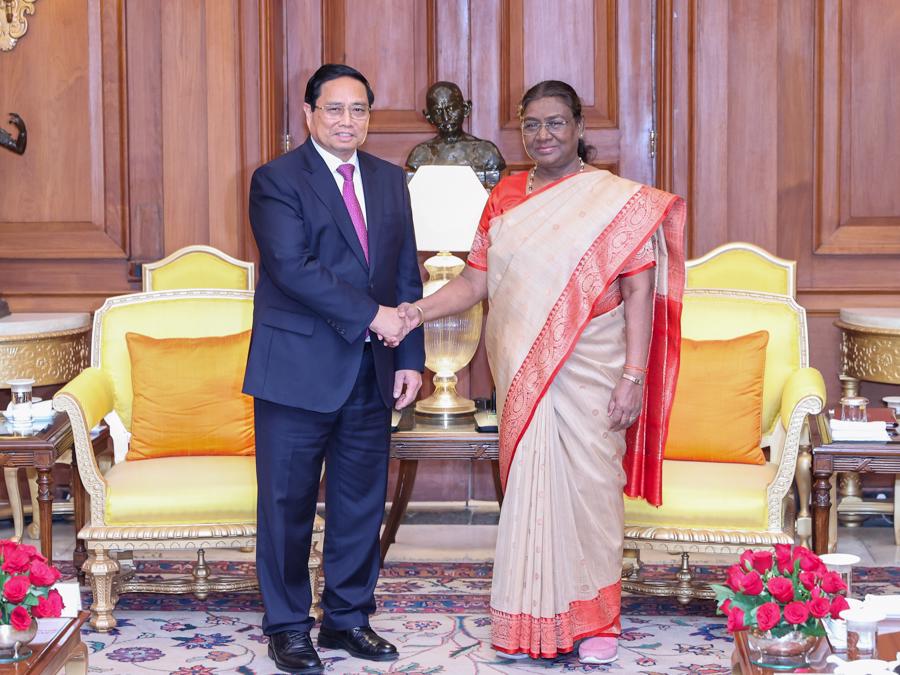
ON DEFENSE AND SECURITY COOPERATION
13. The leaders welcomed the effective implementation of the Joint Vision for India-Vietnam Defense Partnership towards 2030 and the strengthening of defense cooperation between the two countries in recent years in training and capacity building, sharing of experiences, exercises, defense policy dialogue, and defense industrial cooperation. They agreed to further enhance defense cooperation based on shared priorities and concerns, contributing to greater stability in the Indo-Pacific region.
14. The two sides agreed to continue strengthening cooperation in areas such as human resources development, peacekeeping operations, hydrographic surveys, cybersecurity, information sharing, strategic research, maritime security and safety, search and rescue, humanitarian assistance, disaster management, and emergency relief.
15. The leaders agreed to expedite the implementation of the Agreement on Hydrography and the establishment of a joint committee on this issue.
16. The leaders welcomed the signing of two projects utilizing the $300 million credit package provided by the Government of India to the Government of Vietnam.
ON COOPERATION IN INNOVATION, SCIENCE, AND TECHNOLOGY
17. The leaders reaffirmed the importance of digital technology and encouraged the establishment of a framework to promote bilateral cooperation in the field of financial innovation and digital payments between Vietnam and India.
18. Recognizing the national priorities of both countries in digital transformation and energy transition, the leaders agreed to encourage increased exchanges and cooperation in areas such as digital infrastructure, space applications, renewable energy, biotechnology, and disaster-resilient infrastructure.
19. The leaders expressed satisfaction with the cooperation in the field of peaceful uses of nuclear energy and agreed to further enhance opportunities for deeper collaboration as discussed during the 3rd meeting of the Vietnam-India Joint Committee on Civil Nuclear Cooperation.
20. They welcomed the progress in the project to establish the India-ASEAN Satellite Center, Data Reception, and Data Processing Station in Vietnam.
ON CULTURAL, TOURIST, AND PEOPLE-TO-PEOPLE EXCHANGES
21. The leaders appreciated the development cooperation within the framework of the Mekong-Ganga Cooperation (MGC) through quick-impact projects and training scholarships under the Indian Technical and Economic Cooperation (ITEC) Program. They valued the establishment of the High-Performance Computing Center for Development and Training at the Ho Chi Minh City Postal and Telecommunications Institute and the Military Software Park at the Nha Trang University of Telecommunications with the support of the Government of India.
22. The leaders encouraged more research exchanges, training, and student exchanges between universities, scholars, and research institutes of the two countries within the framework of India’s “Viksit Bharat @ 2047” vision and Vietnam’s vision of becoming a developed, high-income country by 2045. They also supported cooperation between research institutes on issues of concern to the Global South.
23. The leaders appreciated the increase in direct flights between the two countries, contributing to the growth of two-way passenger and tourism numbers. They encouraged further enhancement of connectivity and tourism between Vietnam and India.
24. Based on the historical connections and shared heritage between the two countries, the leaders supported the strengthening of exchanges between students and Buddhist dignitaries, pilgrims, and the development of institutes and Buddhist faith facilities. Vietnam appreciated India’s commitment to the restoration of the My Son World Cultural Heritage site and the activities of the Archaeological Survey of India in Tower Groups A, H, and K, as well as the upcoming work in Tower Group F.
25. India appreciated Vietnam’s support in organizing the annual International Day of Yoga in many provinces and cities across Vietnam.
The leaders supported further cooperation between yoga centers of the two countries and bilateral exchanges in the field of traditional medicine, including medicinal plants. They also agreed to strengthen cultural exchanges and media cooperation between the two countries.
ON REGIONAL AND INTERNATIONAL COOPERATION
26. The two sides agreed on the central role of ASEAN in the evolving regional architecture for peace, stability, and prosperity in the region. They supported the strengthening of the ASEAN-India Strategic Partnership, which complements bilateral relations with individual member states. The leaders appreciated the ASEAN-India Joint Statement on Cooperation in the Indo-Pacific for Peace, Stability, and Prosperity, a document that contributes to promoting cooperation opportunities between the ASEAN Outlook on the Indo-Pacific (AOIP) and India’s Indo-Pacific Oceans Initiative (IPOI).
They agreed to continue enhancing cooperation and mutual support at all multilateral forums. India appreciated Vietnam’s consistent support for India’s permanent membership of a reformed UN Security Council.
27. Emphasizing the relationship between security and prosperity, the leaders reaffirmed the importance of maintaining peace, stability, security, and freedom of navigation and overflight in the South China Sea, peacefully resolving disputes in accordance with international law, especially the 1982 United Nations Convention on the Law of the Sea (UNCLOS), and refraining from the threat or use of force. The leaders highlighted the importance of non-militarization and self-restraint, with states refraining from actions that complicate the situation, affecting peace and stability.
They emphasized that UNCLOS is the legal framework governing all activities in the oceans and seas and is the basis for determining the scope of maritime zones, sovereign rights, jurisdiction, and legitimate interests over these zones. They continued to call for the full and effective implementation of the Declaration on the Conduct of Parties in the South China Sea (DOC) and the early conclusion of an effective and substantive Code of Conduct in the South China Sea (COC) in accordance with international law, especially UNCLOS, without prejudice to the rights and interests of other countries, including non-negotiating parties.
28. The two sides strongly condemned terrorism in all its forms and manifestations, including cross-border terrorism. They emphasized the importance of international cooperation in combating this threat, in accordance with international law, especially the UN Charter, and reaffirmed their commitment to contributing to common efforts in this regard.
29. The leaders welcomed the signing of bilateral cooperation agreements, as listed in the annex.
30. Prime Minister Pham Minh Chinh expressed his gratitude for the warm hospitality extended to him and the delegation by the Indian side. He respectfully invited Prime Minister Narendra Modi to visit Vietnam.
New Delhi, August 1, 2024
LIST OF COOPERATION AGREEMENTS
1. Plan of Action for the Implementation of the Comprehensive Strategic Partnership between Vietnam and India for the period of 2024-2028.
2. Memorandum of Understanding on Customs Capacity Building between the General Department of Vietnam Customs and the Central Board of Indirect Taxes and Customs (CBIC) of India.
3. Memorandum of Understanding between the Vietnam Academy of Agricultural Sciences and the Central Agricultural University of Imphal, Manipur.
4. Memorandum of Understanding on Legal and Judicial Cooperation between the Ministry of Justice of Vietnam and the Ministry of Law and Justice of India.
5. Memorandum of Understanding on Broadcasting and Television Cooperation between the Voice of Vietnam and Prasar Bharati of India.
6. Two credit agreements between the Ministry of Finance of Vietnam and the Export-Import Bank of India worth $300 million.
7. Letter of Intent between the Government of Vietnam and the Government of India on the conservation and restoration of Tower Group F at My Son, Quang Nam, Vietnam.
8. Memorandum of Understanding between the Administration of Traditional Medicine, Ministry of Health of Vietnam, and the National Medicinal Plants Board, Ministry of Ayush of India, on cooperation in the field of medicinal plants.
9. Memorandum of Understanding between the Ministry of Culture, Sports and Tourism of Vietnam and the Ministry of Ports, Shipping and Waterways of India on cooperation and development of the National Maritime Heritage Complex (NMHC) at Lothal, Gujarat.
10. Virtual inauguration of the Military Software Park at the University of Information and Communication in Nha Trang with the support of the Government of India.
11. Announcement of Vietnam’s participation in the Coalition for Disaster Resilient Infrastructure (CDRI)
US Ambassador highlights key issues Vietnam needs to address in 12-18 months to attract semiconductor “eagles”
In a recent meeting, Deputy Prime Minister Le Minh Khai discussed with US Ambassador to Vietnam Marc E. Knapper regarding the implementation of agreements following the upgrade of the bilateral relationship to a Comprehensive Strategic Partnership between the two countries.
US Ambassador Marc Knapper: Appreciating Vietnam’s Hospitability and Graciousness
“The United States is committed to strengthening its relationship with Vietnam. Your success is our success, and whether it’s in the areas of trade, investment, healthcare, security, or education, we are long-term partners. I would like to express my gratitude to the Government and people of Vietnam for their warm hospitality and generosity that I receive every year.”
Three breakthroughs and enhancements proposed by the Prime Minister for ASEAN – Australia relations
On March 6th, Prime Minister Pham Minh Chinh attended the Special High-Level Commemorative Conference celebrating 50 years of ASEAN-Australia relations in Melbourne, Australia.







